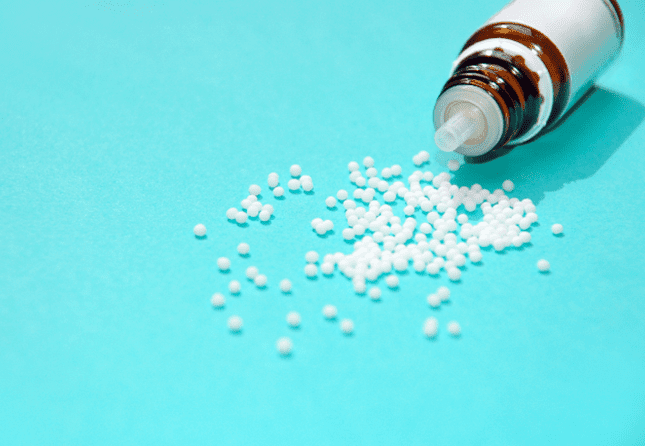Published 16 September 2024
-
Written by Claire Millins

Reviewed by Dr. Abhinav Singh
Fact checking standards
Key takeaways
Homeopathy is a natural approach to healthcare that places emphasis on the body’s own ability to heal itself. In recent years, the use of homeopathic treatments has become more mainstream. In fact, such is the popularity, access to homeopathic remedies is readily available. They are sold in health shops and even some mainstream pharmacies, if you look close enough!
But what is homeopathy?
Homeopathy derives from the following Greek words:
- Homoios – “like, similar, of the same kind”
- Patheia – “disease” and also “feelings, emotions”
What we know today as homeopathy, originated at the end of the 18th century. German physician and chemist, Samuel Hahnemann created the system as an alternative to the standard medical practices of the day, namely blood-letting.
Hahnemann’s system worked by using what he called “the law of similar”. He later defined the system as medical treatments based on minute quantities of remedies that, in larger doses, would produce effects similar to those of the disease being treated. In other words, a substance that, when given to healthy people can cause symptoms, can help heal those suffering from the same symptoms.
The truth of this statement can be seen in Western vaccination programmes. Many of which involve small doses of a disease used in the vaccine to immunize patients against it.
Hahnemann’s original homeopathic manual, the Materia Medica, was created using the results of giving medicinal drugs to healthy individuals and documenting their physiological properties. The tests created a baseline of physical, emotional and mental symptoms unique to each remedy. They also pinpointed the correct dosage, usually very small, which both caused and treated the symptom.
To this day, however, many purists reject homeopathic remedies, and label them as nothing more than having a placebo effect. The reason being is that the remedy’s action involves speculation without proper proof.
Homeopathy uses an individual approach
In homeopathic terms, the physical body manifests illness from the subconscious mind. And, according to the beliefs of homeopathy, disease comes about as a result of personal imbalance. However, the difference between Western medical treatment and homeopathy lies in homeopathy’s individualised approach.
Instead of isolating ad treating symptoms, homeopathy takes into account the total physical and psychological characteristics of the patient. In fact, homeopathy rationalises that to return the body to a state of balance, we must “discover the keys to the language of the body.”
A detailed diagnostic process by your homeopathic practitioner uses symptoms as a means to discover the cause for the underlying disease. However, homeopaths don’t believe that symptoms exist in a vacuum. They believe they evolve from a single ‘constitutional’ weakness which can then be remedied.
This means remedies are specific to each patient.
What are the benefits?
Unlike Western medicine, treatment uses one single medicine to ‘cure’ the underlying single weakness, not on a per symptom basis, i.e., headache, depression, acne.
The goal of homeopathy is to stimulate the body to heal itself without over-medicating. Medication is prescribed in the least possible dose that can elicit a response. These remedies are natural, effective, inexpensive and, most importantly, in general have no side effects. The homeopathy treatment works but everyone is different so what might help you in homeopathy may not help another patient.
Is homeopathy safe?
Generally, homeopathic remedies are safe to use. However, some may contain ingredients that may interfere with other medicines. So, always check with your doctor before using any homeopathic treatments.
Additionally, at the time of writing, in the UK, there is no legal regulation for practising homeopathy. That said, many professional associations, such as the Federation of Holistic Therapists, are a good place to search for a suitably qualified practitioner. This is because their lists have Professional Standards Authority accreditation.
Homeopathy can treat many health conditions from hay fever to stress and anxiety. However, it’s not for everyone and it cannot prevent disease, despite what some people may say.
It’s always advisable to do your own homework and seek medical advice before proceeding.
Until next time darlings.
xx
Disclaimer: This website does not provide medical advice
The information, including but not limited to, text, graphics, images and other material contained on this website are for informational purposes only. No material on this site is intended to be a substitute for professional medical advice, diagnosis or treatment. Always seek the advice of your physician or other qualified health care provider with any questions you may have regarding a medical condition or treatment and before undertaking a new health care regimen, and never disregard professional medical advice or delay in seeking it because of something you have read on this website.
Disclaimer: This website does not provide medical advice. The information, including but not limited to, text, graphics, images, and other material contained on this website is for informational purposes only. No material on this site is intended to be a substitute for professional medical advice, diagnosis, or treatment. Always seek the advice of your physician or other qualified healthcare provider with any questions you may have regarding a medical condition or treatment and before undertaking a new healthcare regimen, and never disregard professional medical advice or delay in seeking it because of something you have read on this website.
Written by
Claire Millins
Reviewed by

Dr. Abhinav Singh
Dr Singh is the Medical Director of the Indiana Sleep Center. His research and clinical practice focuses on the myriad of sleep.





